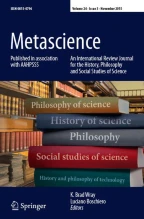How the West was won

This is a preview of subscription content, log in via an institution to check access.
Access this article
Subscribe and save
Springer+ Basic
€32.70 /Month
- Get 10 units per month
- Download Article/Chapter or eBook
- 1 Unit = 1 Article or 1 Chapter
- Cancel anytime
Buy Now
Price includes VAT (France)
Instant access to the full article PDF.
Rent this article via DeepDyve
References
- Acemoglu, Daron, Simon Johnson, and James A. Robinson. 2005. The rise of Europe: Atlantic trade, institutional change, and economic growth. American Economic Review 95: 546–579. ArticleGoogle Scholar
- Barrera-Osorio, Antonio. 2003. Empiricism in the Spanish Atlantic World. In Science and empire in the Atlantic world, ed. J. Delbourgo, and N. Dew, 177–202. New York: Routledge. Google Scholar
- Bennett, Jim. 1998. Practical geometry and operative knowledge. Configurations 6: 195–222. ArticleGoogle Scholar
- Brendecke, Arndt. 2016. The empirical empire: Spanish colonial rule and the politics of knowledge (trans. Jeremiah Riemer). Berlin: Walter de Gruyter.
- Cook, Harold J. 1993. The cutting edge of a revolution? Medicine and natural history near the shores of the North Sea. In Renaissance and revolution: Humanists, scholars, craftsmen and natural philosophers in early modern Europe, ed. J.V. Field, and A.J.L. James, 45–62. Cambridge: Cambridge University Press. Google Scholar
- Cook, Harold J. 2007. Matters of exchange: Commerce, medicine, and science in the Dutch Golden Age. New Haven: Yale University Press. BookGoogle Scholar
- Earle, Rebecca. 2012. The body of the conquistador: Food, race and the colonial experience in Spanish America, 1492–1700. Cambridge: Cambridge University Press. BookGoogle Scholar
- Cañizares-Esguerra, Jorge. 1999. New world, new stars: Patriotic astrology and the invention of Indian and Creole bodies in colonial Spanish America, 1600–1650. The American Historical Review. 104: 33–68. ArticleGoogle Scholar
- Hooykaas, Reijer. 1987. The rise of modern science: When and why? British Journal for the History of Science 20: 453–473. ArticleGoogle Scholar
- Marks, Robert B. 2007. The origins of the modern world. A global and ecological narrative from the fifteenth to the twenty-first century, 2nd ed. Lanham, MD: Rowman & Littlefield. Google Scholar
- Needham, Joseph. 1969. The grand titration: Science and society in east and west. London: Allen & Unwin. Google Scholar
- Pimentel, Juan. 2009. Baroque natures: Juan E. Nieremberg, American wonders, and preterimperial natural history. In Science in the Spanish and Portuguese empires, 1500–1800, ed. Daniela Bleichmar, et al., 93–111. Stanford: Stanford University Press. Google Scholar
- Portuondo, María M. 2009. Secret science: Spanish cosmography and the New World. Chicago: University of Chicago Press. BookGoogle Scholar
- Sivin, Nathan. 1985. Why the Scientific Revolution did not take place in China—Or didn’t it? In Transformation and tradition in the sciences, ed. E. Mendelsohn. Cambridge: Cambridge University Press. Google Scholar
- Smith, Pamela. 2009. Science on the move: Recent trends in the history of early modern science. Renaissance Quarterly 62: 345–375. ArticleGoogle Scholar
- Wulf, Andrea. 2016. The Invention of nature: Alexander von Humboldt’s new world. New York: Knopf. Google Scholar
Author information
Authors and Affiliations
- New Mexico State University, Las Cruces, NM, USA William Eamon
- William Eamon
You can also search for this author in PubMed Google Scholar
Corresponding author
Rights and permissions
About this article
Cite this article
Eamon, W. How the West was won. Metascience 26, 365–372 (2017). https://doi.org/10.1007/s11016-017-0216-8
- Published : 12 June 2017
- Issue Date : November 2017
- DOI : https://doi.org/10.1007/s11016-017-0216-8
Share this article
Anyone you share the following link with will be able to read this content:
Get shareable link
Sorry, a shareable link is not currently available for this article.
Copy to clipboard
Provided by the Springer Nature SharedIt content-sharing initiative

